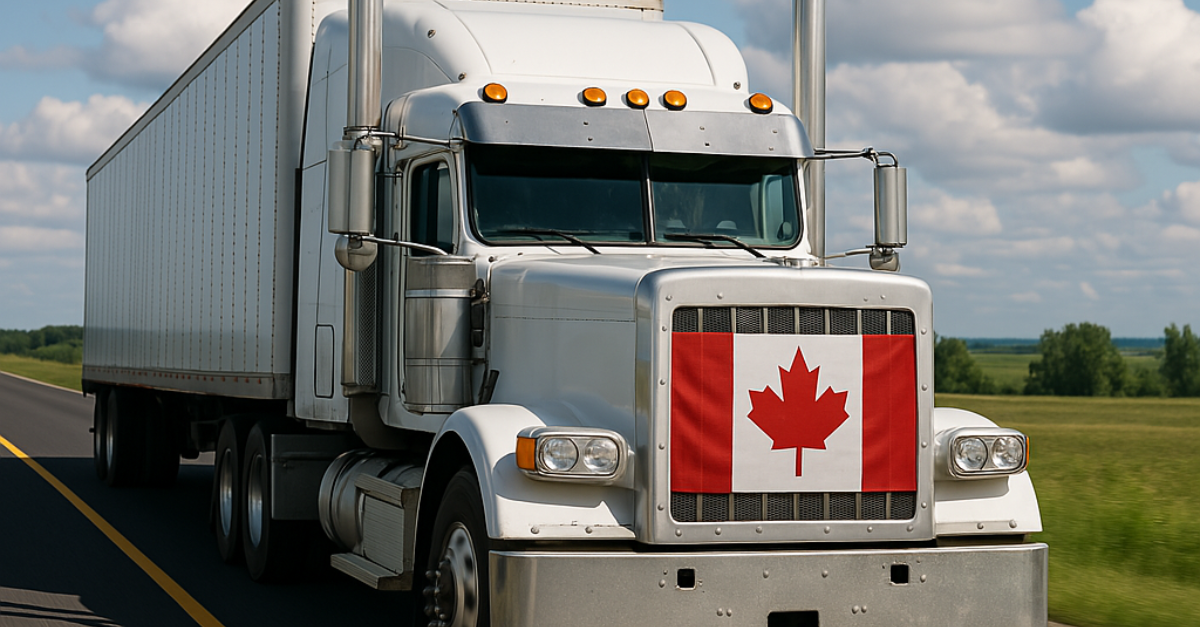Commercial Fleet Management: Strategies, Tools & Tips
Commercial fleet management plays a vital role in keeping businesses running smoothly, especially in industries like transportation, logistics, and...
Keep an eye on the road
Simplify your driver's routine
For efficient decision making
Ensure the compliance of your fleet
Simplify the daily life of your drivers
Maximize the value of your data
Unparalleled monitoring of your assets
The friendly competition that pays off
Planning powered by data
Exceed your customers' expectations
Provide better service to your users
Maximize the satisfaction of your citizens
Simplify your daily life on the construction site
Facilitate the electrification of your fleet
Our experts meet your needs
Easily meet the standards
Improve the safety of your drivers
Protect your data and your fleet
4 min read
![]() Anthony Mainville
Mar 28, 2025 3:12:43 PM
Anthony Mainville
Mar 28, 2025 3:12:43 PM

Canada’s trucking industry stands at a pivotal crossroads. With Transport Canada's Electronic Logging Device (ELD) mandate in full enforcement since early 2023, compliance among federally regulated trucking fleets, particularly large carriers, has reached near-universal levels. By 2025, virtually all major Canadian fleets required to adopt ELDs have done so, significantly accelerating industry-wide digital transformation.
This mandated technological shift delivers crucial gains in compliance, safety, and operational efficiency. Yet it also brings forward an increasingly critical strategic question: Who truly owns and controls the technologies—and the sensitive fleet data—now at the heart of Canada’s transportation sector?
As fleet executives, experts, and policymakers gather at the Canadian Trucking Alliance board meeting, we must look beyond features, compliance, and cost. Now is the moment to evaluate the strategic, economic, and even geopolitical implications of our technology choices. This isn’t about nationalism—it’s about resilience.
The stakes are even higher in 2025, with the return of a second Trump administration in the United States. Escalating trade and tariff disputes, rising cross-border tensions, and renewed talk of "continental annexation" have introduced a volatile new layer of uncertainty to Canada–U.S. relations. Fleet tech may seem like a small battleground, but it’s a critical one: who owns our fleet infrastructure matters more than ever.
Canada has consistently punched above its weight in fleet tech innovation. This country has given birth to some of the most innovative and scalable transportation technology companies in the world—setting benchmarks in compliance, data intelligence, and operational efficiency. Companies like Geotab, headquartered in Ontario, have become global leaders, powering more than 4.7 million connected vehicles across continents.
Analysts estimate that the Canadian fleet telematics market was valued at $430 million USD in 2024, with projections surpassing $500 million by 2026. The stakes are high. And while our domestic innovation story is strong, a new reality is taking shape:
Many formerly Canadian telematics firms have shifted under foreign ownership or control.
This wave of cross-border investment brings both opportunity and risk. Foreign capital can scale innovation—but it can also shift strategic priorities, data governance, and long-term allegiance.
What many fleets don’t realize is that several Canadian-born telematics providers — including some still seen as local — have quietly shifted under U.S. ownership or control in recent years. From holding companies to private equity rollups, these governance changes often happen behind the scenes — but they matter. Because when your vendor’s strategic decisions are made outside Canada, so is the future of your fleet’s data, service, and priorities.
Let’s examine how this shift plays out across the industry:
Several vendors once proudly rooted in Canada now operate under foreign governance structures.
These transitions may not always be visible to the end user, but they can have real consequences on product direction, support responsiveness, and long-term alignment with Canadian values and priorities.
From private equity takeovers to corporate acquisitions, the control of your vendor may have moved — even if their branding hasn’t. And that raises important questions about where decisions are made, and whose interests they ultimately serve.
This shift doesn’t make these companies “bad actors.” But it does introduce a critical new variable: Where do their ultimate loyalties and decision-making reside?
Choosing a telematics partner is about more than hardware or software. It’s about alignment—with your operations, your compliance needs, and your values.
Here’s why:
Homegrown vendors understand nuances like Quebec’s French-language laws, regional HOS variations, and cross-provincial audit requirements. Foreign platforms may deprioritize these in favour of U.S. or EU regulations.
Canadian vendors invest in boots-on-the-ground service—bilingual support, R&D teams here at home, and on-site deployment expertise. That means faster response times and fewer lost-in-translation issues.
ELDs handle deeply sensitive data: driver behaviour, location history, border crossings. If stored in U.S.-based data centres, they may be subject to laws like the Patriot Act or CLOUD Act, which could compel disclosure.
It’s not because a supplier hands out socks with a maple leaf on them that they’re Canadian. Branding is easy — but jurisdiction matters. Before trusting any vendor with your drivers’ locations, HOS logs, or operational history, ask where their leadership sits, where your data is stored, and what laws protect it. You may be surprised.
Foreign-controlled firms may pivot, consolidate, or divest based on global market cycles. Canadian-led partners are more likely to remain committed to Canadian fleets, even when headwinds hit.
Spending with Canadian providers fuels Canadian jobs, R&D, and reinvestment. Every dollar kept here strengthens our logistics ecosystem and keeps innovation rooted in our realities.
In a worst-case scenario, imagine this:
These risks are no longer speculative. With the re-emergence of U.S. protectionist trade policies and mounting pressure on Canadian sectors—including agriculture, green energy, and now logistics—the possibility of digital supply chain disruption is real.
This is about risk management. Canadian data, under Canadian control, is an insurance policy for fleet continuity.
This isn’t about rejecting foreign solutions. Many offer exceptional tech. But Canada must balance innovation with sovereignty. If we default to foreign ownership, we risk hollowing out our own tech ecosystem.
Supporting Canadian-owned vendors isn’t just patriotic—it’s practical:
By encouraging local procurement, industry associations and policymakers can help preserve our competitive edge.
At this Canadian Trucking Alliance board meeting, we have a rare moment to reflect. Our fleet technologies don’t just power vehicles—they define our resilience.
Yes, evaluate ELDs on features, service, and pricing. But also ask: Who owns it? Who governs it? And whose future does it serve?
Patriotic doesn’t mean closed-minded. It means clear-eyed.
Let’s ensure Canada leads not just as a consumer of fleet technology—but as a creator.

Commercial fleet management plays a vital role in keeping businesses running smoothly, especially in industries like transportation, logistics, and...

In fleet management, fleet compliance services play a much bigger role than just checking a box. They’re about keeping your drivers safe, your...

Trucking has always come with its fair share of challenges, from road safety and liability issues to managing fleet efficiency. As the industry...